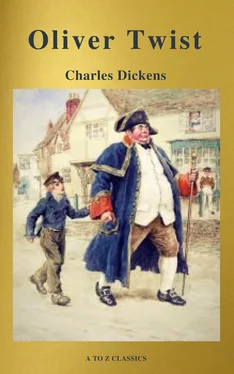‘Gentlemen,’ said the man in blue, with an air of the most consummate dandyism, ‘I’ll give you the ladies; come.’
‘Hear, hear!’ said Sam. ‘The young mississes.’
Here there was a loud cry of ‘Order,’ and Mr. John Smauker, as the gentleman who had introduced Mr. Weller into that company, begged to inform him that the word he had just made use of, was unparliamentary.
‘Which word was that ‘ere, Sir?’ inquired Sam. ‘Mississes, Sir,’ replied Mr. John Smauker, with an alarming frown. ‘We don’t recognise such distinctions here.’
‘Oh, wery good,’ said Sam; ‘then I’ll amend the obserwation and call ’em the dear creeturs, if Blazes vill allow me.’
Some doubt appeared to exist in the mind of the gentleman in the green–foil smalls, whether the chairman could be legally appealed to, as ‘Blazes,’ but as the company seemed more disposed to stand upon their own rights than his, the question was not raised. The man with the cocked hat breathed short, and looked long at Sam, but apparently thought it as well to say nothing, in case he should get the worst of it. After a short silence, a gentleman in an embroidered coat reaching down to his heels, and a waistcoat of the same which kept one half of his legs warm, stirred his gin–and–water with great energy, and putting himself upon his feet, all at once by a violent effort, said he was desirous of offering a few remarks to the company, whereupon the person in the cocked hat had no doubt that the company would be very happy to hear any remarks that the man in the long coat might wish to offer.
‘I feel a great delicacy, gentlemen, in coming for’ard,’ said the man in the long coat, ‘having the misforchune to be a coachman, and being only admitted as a honorary member of these agreeable swarrys, but I do feel myself bound, gentlemen—drove into a corner, if I may use the expression—to make known an afflicting circumstance which has come to my knowledge; which has happened I may say within the soap of my everyday contemplation. Gentlemen, our friend Mr. Whiffers (everybody looked at the individual in orange), our friend Mr. Whiffers has resigned.’
Universal astonishment fell upon the hearers. Each gentleman looked in his neighbour’s face, and then transferred his glance to the upstanding coachman.
‘You may well be sapparised, gentlemen,’ said the coachman. ‘I will not wenchure to state the reasons of this irrepairabel loss to the service, but I will beg Mr. Whiffers to state them himself, for the improvement and imitation of his admiring friends.’
The suggestion being loudly approved of, Mr. Whiffers explained. He said he certainly could have wished to have continued to hold the appointment he had just resigned. The uniform was extremely rich and expensive, the females of the family was most agreeable, and the duties of the situation was not, he was bound to say, too heavy; the principal service that was required of him, being, that he should look out of the hall window as much as possible, in company with another gentleman, who had also resigned. He could have wished to have spared that company the painful and disgusting detail on which he was about to enter, but as the explanation had been demanded of him, he had no alternative but to state, boldly and distinctly, that he had been required to eat cold meat.
It is impossible to conceive the disgust which this avowal awakened in the bosoms of the hearers. Loud cries of ‘Shame,’ mingled with groans and hisses, prevailed for a quarter of an hour.
Mr. Whiffers then added that he feared a portion of this outrage might be traced to his own forbearing and accommodating disposition. He had a distinct recollection of having once consented to eat salt butter, and he had, moreover, on an occasion of sudden sickness in the house, so far forgotten himself as to carry a coal–scuttle up to the second floor. He trusted he had not lowered himself in the good opinion of his friends by this frank confession of his faults; and he hoped the promptness with which he had resented the last unmanly outrage on his feelings, to which he had referred, would reinstate him in their good opinion, if he had.
Mr. Whiffers’s address was responded to, with a shout of admiration, and the health of the interesting martyr was drunk in a most enthusiastic manner; for this, the martyr returned thanks, and proposed their visitor, Mr. Weller—a gentleman whom he had not the pleasure of an intimate acquaintance with, but who was the friend of Mr. John Smauker, which was a sufficient letter of recommendation to any society of gentlemen whatever, or wherever. On this account, he should have been disposed to have given Mr. Weller’s health with all the honours, if his friends had been drinking wine; but as they were taking spirits by way of a change, and as it might be inconvenient to empty a tumbler at every toast, he should propose that the honours be understood.
At the conclusion of this speech, everybody took a sip in honour of Sam; and Sam having ladled out, and drunk, two full glasses of punch in honour of himself, returned thanks in a neat speech.
‘Wery much obliged to you, old fellers,’ said Sam, ladling away at the punch in the most unembarrassed manner possible, ‘for this here compliment; which, comin’ from sich a quarter, is wery overvelmin’. I’ve heered a good deal on you as a body, but I will say, that I never thought you was sich uncommon nice men as I find you air. I only hope you’ll take care o’ yourselves, and not compromise nothin’ o’ your dignity, which is a wery charmin’ thing to see, when one’s out a–walkin’, and has always made me wery happy to look at, ever since I was a boy about half as high as the brass–headed stick o’ my wery respectable friend, Blazes, there. As to the wictim of oppression in the suit o’ brimstone, all I can say of him, is, that I hope he’ll get jist as good a berth as he deserves; in vitch case it’s wery little cold swarry as ever he’ll be troubled with agin.’
Here Sam sat down with a pleasant smile, and his speech having been vociferously applauded, the company broke up.
‘Wy, you don’t mean to say you’re a–goin’ old feller?’ said Sam Weller to his friend, Mr. John Smauker.
‘I must, indeed,’ said Mr. Smauker; ‘I promised Bantam.’
‘Oh, wery well,’ said Sam; ‘that’s another thing. P’raps he’d resign if you disappinted him. You ain’t a–goin’, Blazes?’
‘Yes, I am,’ said the man with the cocked hat.
‘Wot, and leave three–quarters of a bowl of punch behind you!’ said Sam; ‘nonsense, set down agin.’
Mr. Tuckle was not proof against this invitation. He laid aside the cocked hat and stick which he had just taken up, and said he would have one glass, for good fellowship’s sake.
As the gentleman in blue went home the same way as Mr. Tuckle, he was prevailed upon to stop too. When the punch was about half gone, Sam ordered in some oysters from the green–grocer’s shop; and the effect of both was so extremely exhilarating, that Mr. Tuckle, dressed out with the cocked hat and stick, danced the frog hornpipe among the shells on the table, while the gentleman in blue played an accompaniment upon an ingenious musical instrument formed of a hair–comb upon a curl–paper. At last, when the punch was all gone, and the night nearly so, they sallied forth to see each other home. Mr. Tuckle no sooner got into the open air, than he was seized with a sudden desire to lie on the curbstone; Sam thought it would be a pity to contradict him, and so let him have his own way. As the cocked hat would have been spoiled if left there, Sam very considerately flattened it down on the head of the gentleman in blue, and putting the big stick in his hand, propped him up against his own street–door, rang the bell, and walked quietly home.
Читать дальше












